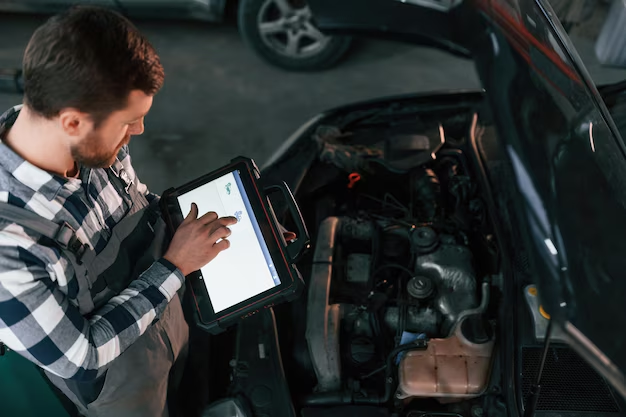Have you ever found yourself stranded in a parking lot, frantically trying to start your car, only to be met with silence? If so, you’re not alone. Electrical failures are one of the most common issues drivers face, often catching us off guard. But what if you could prevent these unexpected breakdowns?
In this guide, we’ll explore essential electrical maintenance tips to keep your vehicle running smoothly and reliably. Whether you’re a seasoned driver or a newcomer on the roads of Springdale, AR, these insights will help you maintain vehicle reliability and performance.
Understanding Your Vehicle’s Electrical System
Before diving into maintenance tips, it’s crucial to understand the basics of your vehicle’s electrical system. This network is the lifeline of your car, powering everything from the engine to the headlights.
The Heart of the System: The Battery
The battery is undoubtedly the heart of your vehicle’s electrical system. It provides the necessary power to start the engine and operate electrical accessories. Regularly checking the battery’s health and ensuring it’s securely mounted can prevent many issues. For instance, consider the case of a commuter who neglects battery maintenance. One chilly morning, the car refuses to start, leading to an expensive tow and replacement. A simple check could have avoided this inconvenience and cost.
Alternator: The Power Generator
Once the engine is running, the alternator takes over. It charges the battery and powers the electrical system while the car is moving. Signs of a failing alternator include dimming headlights or a battery warning light on your dashboard. Imagine you’re driving home from work at night, and suddenly, your headlights start flickering. This is a clear sign to get your alternator checked before it leads to a dead battery and potential breakdown.
The Fuse Box: Safety First
Your car’s fuse box protects the electrical circuits from overload. If a circuit draws too much power, the fuse will blow to prevent damage. Regularly inspect and replace any blown fuses to maintain system integrity. A friend of mine once lost power to their car’s stereo and air conditioning on a hot day because of a blown fuse. A quick replacement solved the problem, saving a trip to the mechanic.
Regular Battery Maintenance
A healthy battery is crucial for preventing electrical failures. Here’s how you can ensure yours stays in top shape.
Checking and Cleaning Battery Terminals
Corrosion on battery terminals is a common issue that can impede electrical flow. Regularly inspect the terminals for any buildup and clean them with a mixture of baking soda and water to ensure a good connection. Let’s say you notice a crusty buildup on your battery terminals during a routine check. Cleaning them immediately can prevent starting issues and extend battery life.
Testing Battery Voltage
Using a multimeter, you can test your battery’s voltage to ensure it’s holding a charge properly. A fully charged battery should read around 12.6 volts. If it’s significantly lower, it may be time for a replacement. A battery replacement can range from $50 to $200, depending on the make and model, but it’s a small price to pay compared to the inconvenience of a breakdown.
Alternator Care and Troubleshooting
Your alternator is vital for keeping your battery charged and your electrical system running smoothly. Here are some tips to ensure it functions properly.
Recognizing Signs of Alternator Trouble
If you notice flickering lights or strange noises while driving, it might indicate alternator trouble. Get it checked immediately to avoid being stranded. I recall a time when I ignored these symptoms, thinking it was just a minor issue. It resulted in a dead battery and an unplanned visit to the auto shop, costing me over $400 for alternator replacement.
Regular Inspection and Testing
During routine maintenance, ask your mechanic at ASAP Automotive Service & Performance to inspect the alternator belts and connections for wear or damage. Regular testing can catch issues before they become severe. An alternator inspection might cost around $50, but it’s a worthwhile investment to prevent more significant expenses.
Caring for Your Vehicle’s Wiring
The wiring in your vehicle is like the veins in your body, carrying electricity to where it’s needed. Here’s how to keep them in good condition.
Inspecting for Wear and Tear
Regularly inspect exposed wires for signs of wear, such as cracks or fraying. Damaged wiring can lead to shorts and electrical failures. A friend once ignored a frayed wire, which eventually led to a short circuit, costing them over $100 in repairs.
Securing Loose Wires
Vibrations from driving can loosen connections over time. Ensure all wiring is securely fastened and away from moving parts to prevent wear. This simple task can save you from costly electrical repairs in the future.
Seasonal Tips for Electrical Maintenance
Different seasons bring unique challenges to your vehicle’s electrical system. Here’s how to adapt your maintenance routine accordingly.

Surviving Winter in Springdale, AR
Cold weather can be tough on your battery. Make sure it’s fully charged and consider using a battery warmer if temperatures drop significantly. A battery warmer might cost between $20 and $50 but can prevent freezing damage.
Summer Heat and Electrical Components
Extreme heat can cause battery fluid to evaporate, damaging the internal structure. Regularly check fluid levels and top off with distilled water if necessary. A little attention during summer can prevent the need for a costly battery replacement.
The Importance of Regular Professional Check-Ups
While DIY maintenance is essential, regular professional check-ups at a trusted service center like ASAP Automotive Service & Performance are crucial for comprehensive care.
Scheduling Routine Inspections
Plan for regular inspections at least twice a year. Professional mechanics can spot potential issues early, saving you time and money in the long run. These inspections typically cost between $50 and $100 but provide peace of mind.
Utilizing Professional Diagnostic Tools
Professionals have access to advanced diagnostic tools that can pinpoint issues not visible to the naked eye. This ensures a thorough assessment of your vehicle’s electrical health. A diagnostic test might cost around $100, but it’s invaluable for catching hidden problems.
DIY vs. Professional Maintenance: Finding the Balance
Understanding when to perform DIY maintenance and when to seek professional help is key to keeping your vehicle reliable.
When DIY is Enough
Simple tasks like cleaning battery terminals or checking fluid levels can be done at home. These small efforts can significantly enhance vehicle performance. By taking care of these tasks yourself, you can save on labor costs, which often start at $100 per hour at professional shops.
Knowing When to Call the Pros
For more complex issues like alternator problems or persistent electrical failures, it’s best to consult professionals. ASAP Automotive Service & Performance in Springdale, AR, is here to help with expert advice and repairs.
Maintaining your vehicle’s electrical system is crucial for preventing unexpected failures and ensuring reliable performance. By following these tips, you’ll keep your car running smoothly, whether you’re commuting around Springdale or embarking on a road trip.
For comprehensive care and expert assistance, reach out to ASAP Automotive Service & Performance. Our team is ready to help keep your vehicle in top condition, ensuring you’re never left stranded by a preventable electrical issue.

